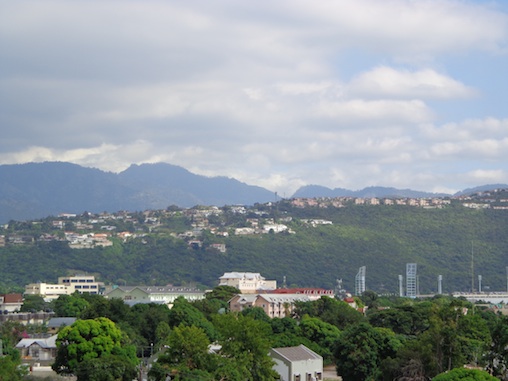Above: Kingston (CJ Photo)
By the Caribbean Journal staff
Jamaica is now “finalizing” a new agreement with the International Monetary Fund, along with a debt exchange offer to be made Tuesday, Prime Minister Portia Simpson Miller said in a national address Monday night following another IMF mission visit to the country.
The centrepiece of the IMF agreement will be a commitment to “significantly reduce” Jamaica’s debt, she said, from its current level of over 140 percent of GDP.
She said that a National Debt Exchange Offer would be launched Tuesday, something the Prime Minister called a “critical” component of the IMF agreement and the government’s Debt Reduction programme.
“It can only succeed with the fullest cooperation of the broad financial sector and the support of the entire country,” she said.
The negotiations to secure a new Extended Credit Facility agreement with the IMF have been a major stated priority of the People’s National Party government, which won the country’s elections in December 2011, but the government has not yet struck a deal.
Finance Minister Dr Peter Phillips said the deal the country is finalizing is “the best we could negotiate for Jamaica.”
The aforementioned Debt Exchange Offer will be launched “with the support of leading private sector financial institutions,” Phillips said.
The Finance Minister cautioned bondholders that there would be “no haircut on their principal investment.”
“This offer, which we urge bondholders to accept, will make possible the reduction of our debt to GDP ratios by 8.5 percent or around $17 billion per year between now and 2020,” he said.
The exchange, he said, would trade higher-interest debt for lower-cost debt and would entail “significant sacrifices from our financial institutions and the holders of our domestic bonds,” he said.
“It will be painful and difficult, but we have no option,” he said.
“Many of our bondholders, with good reason, will immediately respond to this announcement with a sense of disappointment, as they recall that they made a similar sacrifice for Jamaica three years ago, when they were assured that their sacrifice would have put Jamaica on the path of growth and stability,” he said. “I am only too aware of the fact that for them to be asked to make another sacrifice at this time is a burden that will be hard to bear.”
The end goal is to reduce Jamaica’s debt-to-GDP ratio from 140 percent of GDP to 95 percent over the next five years, Phillips said.
He said that the country would need take several more steps, including intensifying tax reform efforts, ensuring greater levels of tax compliance and “public sector transformation.”
Phillips said there were several prior actions Jamaica will have to take to secure the support of the IMF board.
One is eliminating discretionary tax waivers, along with securing a contract with public sector workers to achieve a wage-to-GDP ratio of 9 percent by 2015/2016.
Jamaica has already completed another prong, the passage of a Public Debt Management Act, he said.
Pointing to a similar debt deal three years ago, Phillips said that this time around would be different, with the implementation of measures such as the creation of an Economic Programme Oversight Committee and a unit in the Ministry of Finance that would ensure that all agencies and departments meet the IMF timelines.
It all hinges on growth, however, for a country that is projected to post the slowest growth of any in the Caribbean this year.
Phillips said projects like the government’s major logistics hub initiative, the completion of a north-south link for Highway 2000 and the development of eight agro parks would make a dent in the negative prospects, along with tourism and new ICT projects.
He also said the China Communications Construction Company, the parent company of China Harbour, had recently established an investment arm which plans to establish an office in Kingston.
“We now have a real opportunity to confront and conquer the root causes of our longstanding economic difficulties,” Simpson Miller said. “Every single Jamaican is a stakeholder in this enterprise called our economy.”
